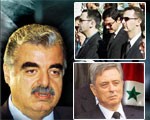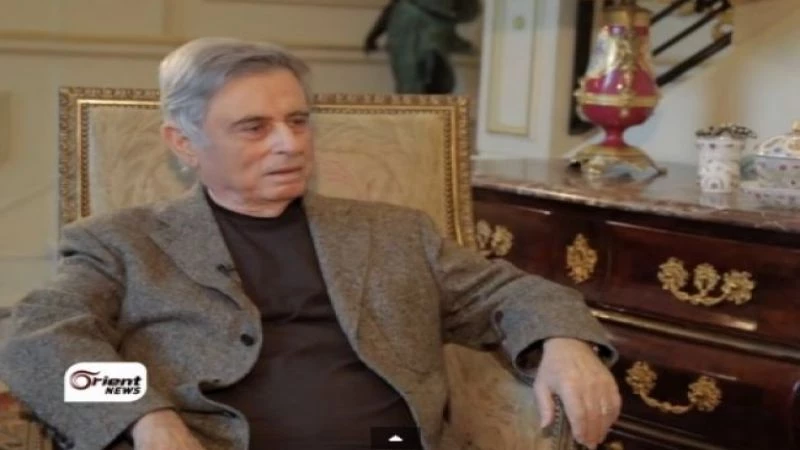I deeply regret my association with Hafez Al-Assad throughout my career.
We had the opportunity to speak with former Vice President of the Syrian Republic, Abdel Halim Khaddam, regarding the circumstances surrounding his “remarkable” resignation, making him the highest-ranking official to step down.
During the interview, Khaddam highlights the increasingly intolerable situation in Syria after Bashar assumed power. He admits to feeling dissatisfied with the aftermath of his resignation, but his concerns were quickly dismissed during a meeting with Bashar, who requested his mediation with former French President Jacques Chirac.
Khaddam expresses profound remorse regarding his political career alongside the late President Hafez Al-Assad. He emphasizes that his initial agreement with Hafez Al-Assad stemmed from his aspirations to build a democratic Syria that upholds freedom and justice. However, the situation changed, leading to favoritism and corruption. Here are the details:
- When you announced your resignation, what was Bashar’s response? Did you anticipate being able to leave the country safely, given your three decades of access to Syria’s secrets?
The situation had become unbearable, and change was necessary. Of course, Bashar Al-Assad promptly called me after my speech at the conference, and we arranged a meeting. He said, “I heard your speech, and I appreciated your explanation of the situation. However, I would like to understand why you submitted your resignation.” I responded with a sense of satisfaction, saying, “I want to take a rest and go on vacation abroad to write my memoirs.” He asked, “How long do you need to rest?” and I replied, “One or two months.” He inquired about my travel plans, and I informed him that I would be leaving on Friday. He said, “Before you travel, we should talk.” Honestly, I was not satisfied with his response. On Thursday, he called me and said, “Since you are traveling to Paris, we can mediate with your friend Chirac and attempt to resolve the dispute between us.” I replied, “Yes.” I felt a sense of security, and I left reassured. All my family members also departed from Syria.
A Profound Disagreement
- What caused the rift between Chirac and Bashar? Did you act as a mediator between them?
No, certainly not. Assad had a deep disagreement with Chirac. Bashar Al-Assad’s son launched a vigorous campaign against the French, particularly targeting Jacques Chirac, when Chirac accused Assad of Hariri’s assassination. I met President Chirac two or three times and explained the reason for my resignation. In one letter, he advised me, “My recommendation is not to return to Syria because if you do, they will kill you.”
- Chirac accused Assad of assassinating Hariri, and Bashar asked you to mediate with Chirac and convince him otherwise. What led you to believe that Assad was responsible for Hariri’s murder?
It is my firm conviction that Bashar Al-Assad is the perpetrator behind Hariri’s assassination, as no security agency can take such action without the President’s approval. No one other than Assad has an interest in killing Hariri. A week prior to Hariri’s death, a meeting of party leaders was held to discuss an internal organizational matter unrelated to foreign policy. Suddenly, Bashar Al-Assad stated, “Hariri is conspiring against us, Chirac, and the Americans. Hariri is our ultimate enemy.” This speech stunned the members of the leadership, and at that moment, I asked him, “Why bring up this issue now, and what purpose does it serve?” He remained silent and did not provide an answer.
The Assassination of Hariri:
- Hariri was your friend. Did you try to warn him about the assassination attempt?
Yes, because I understood how Bashar Al-Assad thinks. The day after, I sent a message to Rafik Hariri through Mohsen Dalloul, urging him to pack his belongings and leave Lebanon. Two days later, my friend Marwan Hamadeh survived an assassination attempt. I visited him in the hospital and then went to Rafik Hariri’s house, where we had lunch together. We had extensive discussions. Abu Bahaa asked me about the content of the message I had sent to Hariri. I advised him, “You should leave Lebanon early tomorrow because they will kill you.” He replied, “But Maher (referring to Maher Al-Assad) called me and said that I am their friend and a close confidant.” I responded by explaining, “They did this to give you a false sense of security and deceive you.” Unfortunately, he did not heed my words and believed their assurances. On the third day, he was murdered.
- I understand from your words that Hariri was reassured by Assad and that he had already been threatened by him.
During his visit to Bashar, Hariri received multiple warnings and threats in the presence of numerous leaders. He was also threatened by the head of the intelligence service, Rustam Ghazali, who operated with absolute impunity in Lebanon. Ghazali informed Hariri that he would eliminate anyone who dared to disobey him. Hariri appeared troubled after every meeting. Naturally, when Brigadier Maher Al-Assad called him to reassure him as a friend and confidant, Rafik Hariri believed their words and protected their malicious intent.
- I am not involved. It is said that the management of the Lebanese file witnessed the most significant political assassinations. What are your thoughts?
No, assassinations were prevalent within the regime, and Lebanon experienced sectarian conflicts. However, this does not mean that I was involved in these assassinations. I focused on managing the political file and attempted to foster cooperation between the two governments.
- Did you never feel that you could be the next target on the assassination list?
Certainly, if I had openly opposed Assad, be it the son or the father, I would have undoubtedly faced numerous assassination attempts. However, I exercised caution when expressing my opinions. There were five assassination attempts against me during my time in office. I employed a security team for my protection. Hafez Al-Assad was deeply disturbed by these attempts as it affected the entire regime.
• I mean, you are the repository of Hafez Al-Assad’s secrets. Did he trust you enough to confide in you with his deepest secrets?
Certainly. Based on my conviction and information, yes, he trusted me. I cannot claim to know everything about Hafez al-Assad, as nobody knows everything about another person. However, it doesn’t mean that I am not aware of the most accurate issues and files, considering my close proximity to Hafez Al-Assad.
• What changed with Assad’s son, and why didn’t he trust you like his father did?
Hafez Al-Assad possessed a calculating and cautious mind. He made decisions only when he was confident of success, never acting randomly. In contrast, his son is prone to impulsive behavior and fails to consider the consequences. There is a significant difference between him and his father.
Waste File:
• What is the truth behind the toxic waste file, which implicated your children? Was it an attempt to implicate you?
The waste file is a complete fabrication. I was present in Syria on that day. In reality, the waste was located in an area called Tartous. Someone from that area, who happened to be a friend of one of the intelligence officers, contacted him to facilitate the transportation of the waste for burial in the desert. The matter came to light and was made public. The officer involved in the case spread rumors, falsely implicating Abdel Halim Khaddam’s sons, while he himself held a position as the deputy head of the Military Intelligence Division.
Upon receiving the news, I requested Hafez Al-Assad to form a committee consisting of five competent ministers and several technical experts. They went to Tartous and conducted an investigation, working alongside the port authorities and relevant individuals. The committee’s findings confirmed that the children of Vice President “Abu Jamal” had no connection to the case. President Hafez Al-Assad personally assured me, stating, “Your children have nothing to do with this matter.” Subsequently, the waste owner, Mohammed Tabaro, was brought before the Criminal Court and sentenced to 10 years. Unfortunately, his military associate managed to remove his name from the file.
Salvation Front:
• After announcing your departure, you formed the National Salvation Front. Was your intention to create opposition against the regime?
Following my departure in 2005, I made the decision to fight for the Syrian people and sought to establish a national democratic front. This initiative aimed to explore avenues for democratic change in Syria. I reached out to various individuals, and we agreed to hold the founding conference in Britain. The front consisted of three movements, including the Baath Party, the Muslim Brotherhood, and the Kurds.
Subsequently, the National Salvation Front was dissolved due to several reasons. We experienced disagreements with the Muslim Brotherhood, particularly regarding decision-making processes. We had agreed that no decisions would be made without consulting within the Salvation Front. However, the Muslim Brotherhood started making decisions without involving the Front’s members, which led to our separation.
• Do you regret any aspect of your political career?
Yes, when I reflect on my journey, I feel profound regret. What I regret the most is my collaboration with Hafez Al-Assad because I aligned myself with him based on the vision of building a democratic state that upholds freedoms and justice. However, the situation took a different turn, marked by favoritism and corruption.


